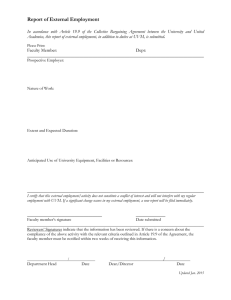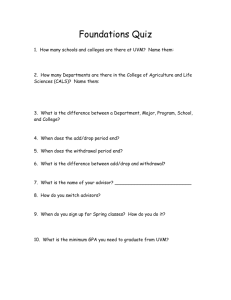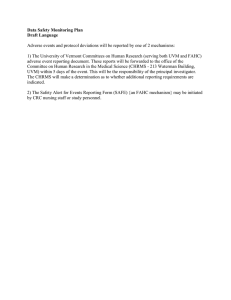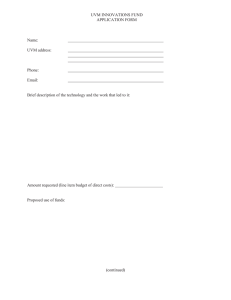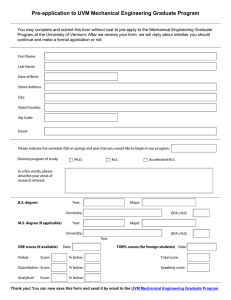Becoming Involved in Disaster Preparedness and Response in Your Community
advertisement
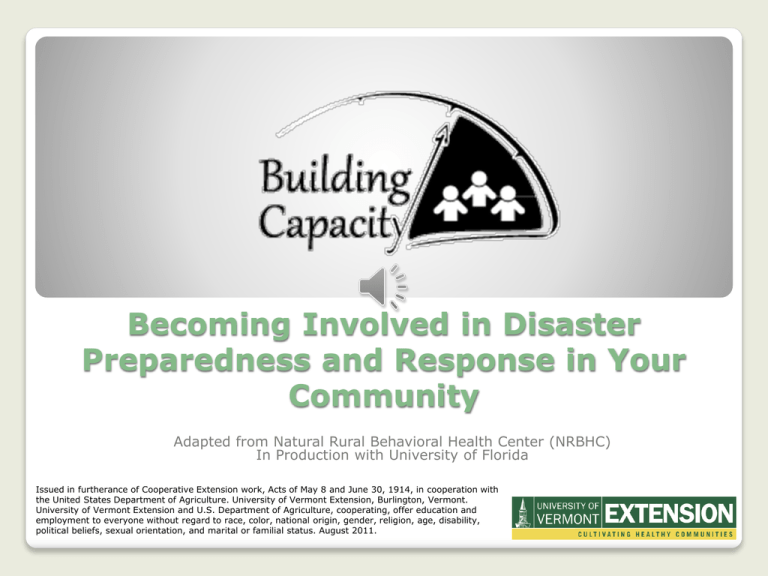
Becoming Involved in Disaster Preparedness and Response in Your Community Adapted from Natural Rural Behavioral Health Center (NRBHC) In Production with University of Florida Issued in furtherance of Cooperative Extension work, Acts of May 8 and June 30, 1914, in cooperation with the United States Department of Agriculture. University of Vermont Extension, Burlington, Vermont. University of Vermont Extension and U.S. Department of Agriculture, cooperating, offer education and employment to everyone without regard to race, color, national origin, gender, religion, age, disability, political beliefs, sexual orientation, and marital or familial status. August 2011. • Find out about existing preparedness efforts in your community so you do not have to reinvent the wheel. Irene Relief Aid and Resources: http://www.efficiencyvermont.com/about_us/efficiency_vermo nt_news/Irene/general_info/irene_recovery.aspx FEMA Recovery information for VT residents: http://www.uvm.edu/extension/?Page=emergency_fema.html Before You Get Started • Determine how you can become involved in existing efforts and define your role in these efforts. UVM Leadership & Civic Engagement: http://www.uvm.edu/~vfwf/?Page=instructions/criteria. html&SM=instructions/sub-menu.html American Red Cross (VT & NH) http://www.redcrossvtnhuv.org/general.asp?SN=8084& OP=8098&IDCapitulo=44W8UXGL8L Before You Get Started • Participate in emergency planning • Providing individual support to those affected by a disaster How to help support VT communities affected by ‘Irene’ http://www.uvm.edu/extension/?Page=e mergency.html#how_to_help Roles for Community Professionals • Inform the community about the effects of disaster, warning signs for post-disaster stress, how to provide emotional support and stress management strategies. Dealing with Disasters: http://www.extension.iastate.edu/topic/recoveringdisasters Irene Recovery Effort website: http://www.uvm.edu/~lce/ Training Your Community • Develop web-based and written educational materials • Provide schools, work and faith based educational programs • Develop media contacts Resources for Educators: http://www.uvm.edu/extension/?Page=emergency.html#schools Educate Community Members • Rumor control • Mental health services • Economic supports Vermont Department of Health: http://healthvermont.gov/ Vermont Response Blog: http://vtresponse.wordpress.com/ Build Collaboration For Long-Term Recovery Services in the Community • Contact community planners and found out how to become involved • Determine what knowledge and resources you have to lend after a disaster event University of Vermont Emergency Management http://www.uvm.edu/~emergncy/ Vermont 2-1-1 http://www.vermont211.org/ Participate in Emergency Planning • Build partnerships with local (Extension and CAP Agencies) and regional (Red Cross) helpers UVM Extension Service: www.uvm.edu/extension American Red Cross (VT & NH) http://www.redcrossvtnhuv.org/index.asp?IDCapitulo=44 W8UXGL8L Participate in Emergency Planning • Encourage use of healthy coping strategies and stress management techniques • Distributing information on the mental health effects of disaster and services available Coping with Disaster: http://www.mentalhealthamerica.net/go/information/ get-info/coping-with-disaster Provide Individual Support • Providing referrals to local mental health resources VocRehab: http://www.uvm.edu/~farmfam/ VT Department of Mental Health: http://mentalhealth.vermont.gov/ Resources for parents and teachers: http://www.ready.gov/kids/index.html Provide Individual Support For more information about UVM Extension’s Building Capacity programs, visit our website: http://www.uvm.edu/extension/community/buildingcapacity/ Contact Building Capacity: capacity@uvm.edu
